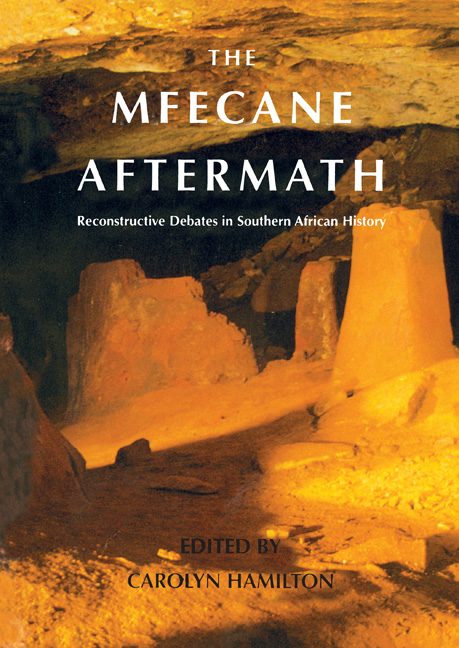Book contents
- Frontmatter
- Contents
- Maps
- Preface
- Acknowledgements
- Notes on Orthography and Names
- Contributors
- Introduction
- Part One Historiography and Methodology
- Part Two The South-Eastern Coastal Region
- Part Three The Interior
- Glossary
- Abbreviations
- Bibliographer's Note
- Bibliography
- Complete List of Papers Presented at the Colloquium
- Index
Introduction
Published online by Cambridge University Press: 31 May 2019
- Frontmatter
- Contents
- Maps
- Preface
- Acknowledgements
- Notes on Orthography and Names
- Contributors
- Introduction
- Part One Historiography and Methodology
- Part Two The South-Eastern Coastal Region
- Part Three The Interior
- Glossary
- Abbreviations
- Bibliographer's Note
- Bibliography
- Complete List of Papers Presented at the Colloquium
- Index
Summary
In 1991 a colloquium was held at the University of the Witwatersrand, Johannesburg, South Africa, entitled The Mfecane Aftermath: Towards a New Paradigm'. The title was a play on the name of John Omer-Cooper's 1966 publication, The Zulu Aftermath: A Nineteenth-Century Revolution in Bantu Africa. Omer-Cooper, following George McCall Theal's writings some seventy years earlier, argued that the emergence of the powerful Zulu kingdom in the early decades of the nineteenth century caused massive upheaval among neighbouring chiefdoms. This, in turn, set in motion a ripple effect of dislocation and disruption that extended through much of southern Africa, namely, the ‘Mfecane’. Omer-Cooper's study celebrated both the revolutionary changes within the Zulu kingdom which lay at the root of the tumult, as well as African responses to it - the innovations and achievements which underlay the period of migrancy and increased state-building throughout the sub-continent. This, then, was what Omer-Cooper focused on as the ‘aftermath’ of the Zulu.
In a series of papers presented at seminars starting in 1983, Rhodes historian Julian Cobbing mounted a campaign for the ‘jettisoning’ of the concept of the mfecane. Cobbing argued that the idea of a ‘Zulu explosion’ which set in motion the mfecane was a settler myth which conveniently obscured the disruptions of local societies caused by the labour needs of the Cape colonists and the demands of the Delagoa Bay-based slave trade. Despite their preparation for prestigious forums such as the seminar of the Centre for African Studies, University of Cape Town, and the African Studies Institute seminar at the University of the Witwatersrand, Cobbing's early papers elicited little response from historians. Then, in 1987, Cobbing presented yet another version of his case at the University of Durban- Westville, ‘The myth of the mfecane’. Shortly after that, in 1988 and 1989, an eminent historian of Natal and the Zulu kingdom, John Wright, collaborated with Cobbing in joint presentations to seminars at the University of the Witwatersrand and the University of Cape Town, entitled The Mfecane: Beginning the Inquest'. Attention to the debate shown by Natal-based interests and historians of the Zulu kingdom was stimulated in the later 1980s both by an efflorescence of new scholarship on the early Zulu kingdom and by contemporary political developments within Natal and KwaZulu.
- Type
- Chapter
- Information
- Mfecane AftermathReconstructive Debates in Southern African History, pp. 1 - 10Publisher: Wits University PressPrint publication year: 1995

